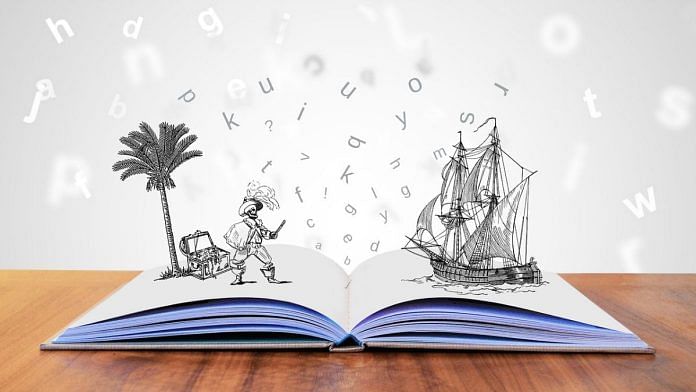Thank you dear subscribers, we are overwhelmed with your response.
Your Turn is a unique section from ThePrint featuring points of view from its subscribers. If you are a subscriber, have a point of view, please send it to us. If not, do subscribe here: https://theprint.in/subscribe/
The best evidence from archaeology and anthropology suggests the human mind evolved with storytelling. About a million years ago our hominid ancestors began gaining control of the use of fire. Fire has had a telling effect on the lives of humans ever since, especially in story telling!!! Around bonfires providing warmth, protection against predators, and the ability to cook; food and stories helped develop human brains and promoted social bonding.
“…And if you try to understand where this ability to cooperate in large numbers comes from, you get to storytelling because it’s the basis of every large-scale human cooperation.”
– Yuval Noah Harai
There is no better example of the power of storytelling than ancient India where the puranas, the great epics Ramayana and Mahabharata shaped people’s thoughts through storytelling. Local folklore also have always been a primal form of communication within limited geographies. These stories are timeless links to ancient traditions, legends, archetypes, myths, and symbols. They connect us to a larger self and universal truths.
They provide a common identity to diverse people over large geographies. Stories are the links that allows people to communicate, overcoming reticence and differences. Stories allow people to understand better and to find commonality across societies.
Telling stories is an art form with a greater purpose—stories are remembered eternally while facts are forgotten in a day or two. Whether it is the folklore from North Malabar about the warlord Thacholi Othenan or the exploits of Arjuna the warrior from the epic Mahabharata, the stories have been repeated over generations and still continue to inspire. In many places the folklore has seamlessly intermixed with stories from the epic creating a unique fabric of narration unifying a civilization, over millennia.
Stories are how people think. They are how people make meaning of life through scripts, mental models, metaphors, or narratives. Stories are through which people explain working of things, making decisions and justify them, persuade others, understand women’s place in the world, create identities, and define and teach social values. The Indian way of life (later declared as the Hindu religion by Western neo cultures) was proliferated through such inspiring web of folklore and stories.
Leaders teach, inspire and influence through the media of story telling. Ancient epics of India and Greece and the holy texts are all examples of uniting people through storytelling.
Stories convey the culture, history, and values that give identities and unite people. Stories are the basic fabric that connect people across geographies and promote a common culture. India that is Bharat is a fine example. The name Bharath is important as it is in Bharath the stories originated and took root. India came later. It does not matter today as India has morphed into that old Bharath and grown richer with addition of new stories. People understand intuitively that the stories they hold in common are an important part of the ties that bind.
Humans seek certainty in a narrative structure which is familiar, predictable, and comforting. The Bollywood films for decades followed a familiar story line, boy meets girl, falls in love; the villain appears to foil the love; the story ends with the hero overpowering the villain. The success was as humans, within the story arc, can withstand intense emotions because we know that resolution follows conflict. The experience had a safety net.
These days technology has taken over storytelling.
In spite of all the excitement, technology has overtaken human brains and traditional ways to communicate faster to more people than was obtained around a bonfire. Human brains still respond to content by looking for the story to make sense out of the experience.
Stories leap-frog the technology and bring us to the core of the experience, as any good storyteller in social media or otherwise knows. Yet most of these new “stories” have very little shelf life. Stories exchanged through word of mouth transcend time and get embedded in our memories.
Tailpiece: There is great deal of Indian way of life, across the length and breadth of the country, from ancient times originated from the puranas and the epics, which were initially passed down by word of mouth. Although all the languages of India do not belong to the same family, their literary inheritance is common. The literary wealth of Ramayana, the Mahabharata(the Bhagwat Gita is part of this epic) , the Puranas and other ancient texts has been inherited by all Indian languages alike. The origin of epics, as that of all forms of ancient Indian literature, has been traced to the Vedas.Today there are books written by modern scholars like Gurcharan Das, Devdutt Pattanaik, Ashish Tripathi and Subramanian Jaishankar, among others basing their works drawing parallels from the epics.
These pieces are being published as they have been received – they have not been edited/fact-checked by ThePrint

